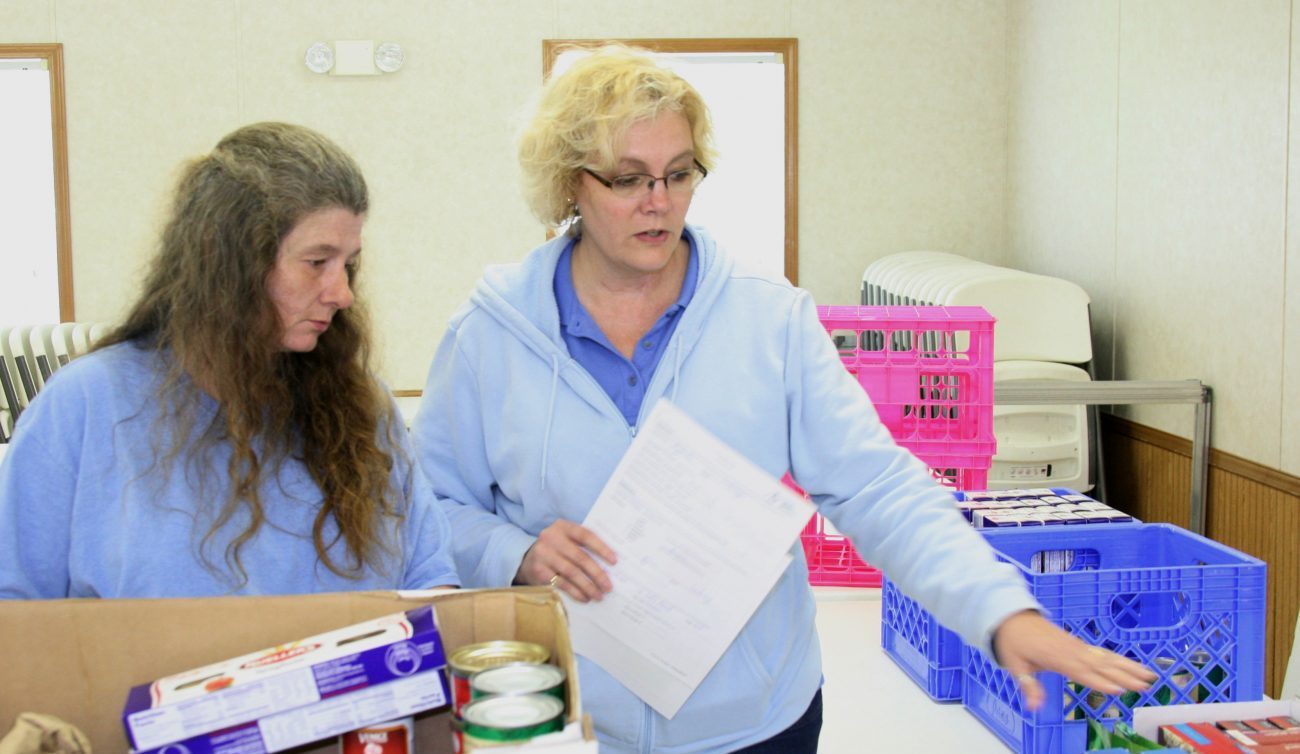AMMA, W.Va. (CNS) — “I made sure I had food for my kids, but I haven’t eaten for two days.”
Debra Shaffer, a regional director for Catholic Charities West Virginia, has never forgotten the day a mother in need spoke those words to her during the Wellness Works Mobile Food Pantry’s visit to a remote southern West Virginia community.
Holding back tears as she remembered the moment, Shaffer said, “I told her, ‘You will eat today.'”
[hotblock]
This is the mission of the mobile food pantry, which travels to places where the greatest need exists — food deserts, which Catholic Charities officials said are growing in West Virginia.
Shaffer, who is director of the agency’s Parkersburg region, was in Amma the day she remembered the story of the mother in need of help. The food pantry was making its regular stop at the Amma Community Senior Center. That day, April 25, the pantry served 45 families of the area who, Shaffer said, would not have access to food without the presence of the mobile food pantry.
“There aren’t any other food sources in this area,” Shaffer told The Catholic Spirit, newspaper of the Diocese of Wheeling-Charleston. “Without the food provided, many of them would go without.”
Michelle Nicholson is one of the many residents of the region who need the services of the mobile food pantry. As she scanned through the variety of food available to her in Amma that day, she expressed her gratitude for the pantry and to the many volunteers who staff it.
“I’m low income,” she said. “At the end of the month we’re always needing help, and they’re here.”
Nicholson’s home in nearby Left Hand was destroyed by fire just three weeks prior to her visit to the pantry. “I hope we always keep it around,” she said.
The mobile food pantry began four years ago and makes regular visits to the most remote areas of Calhoun, Doddridge, Ritchie, Roane and Wirt counties in West Virginia. It is an extension of Catholic Charities West Virginia’s Wellness Works Food Program, whose goal is to promote healthy eating and wellness among its clients.
“We try to provide additional assistance with educational materials in regard to healthier lifestyles and food choices,” Shaffer said. “We try to bring foods that are a healthier choice. We provide recipes that people really seem to enjoy.”
The mobile food pantry also offers taste samplings for clients to introduce them to new, healthier selections. “We even put kits together,” Shaffer said, “so if you like this, well everything that you need to make this at home is in this bag, including the recipe.”
Clients who come to the pantry also are provided with a shopper’s guide with a checklist to help them make the best and healthiest selections for their households. At times, representatives from the West Virginia Health Department join volunteers on food pantry visits to provide health screenings.
Since the program began, Shaffer said, there have been many success stories.
“We’ve had people tell us that their blood pressure has greatly improved,” she said. “One lady told us that her husband had gone down two pants sizes because they had begun to eat healthier.”
[hotblock2]
She remembered one food pantry visit in which a man in his 30s had his blood pressure checked for the first time in his life.
In May, the food pantry will begin distributing garden plants to encourage people to begin to grow some of their own food.
“Even if that means that they have one tomato plant in a pot,” Shaffer said.
She said the need is great in all of the areas to which the mobile food pantry travels, and she recognized the many volunteers and other Catholic Charities sites around the state working to help those in need.
“We do what we can,” she said.
***
Rowan is editor of The Catholic Spirit, newspaper of the Diocese of Wheeling-Charleston.
PREVIOUS: Top U.S. Catholic and Mormon leaders discuss common concerns
NEXT: Faith-based diplomacy has potential to make world better, say speakers




I am curious–is there anywhere these folks could garden? Even if they don’t have a yard suitable for gardening, there are many inexpensive tricks one can use to garden, such as flower beds on wheels, giant pots, etc. which I have begun using. People need shown these techniques, and how to start their own seeds, as started plants are prohibitively expensive even if one has access to garden centers.
Could a branch of the food bank be organized to teach gardening and help find land for community gardens? Many churches have large pieces of land/lawns that could be gardened. These folks don’t just need food, they need the pride of being self-sufficient. I grew up in W.Va. Every time I look at photos of my home town (Weirton) I am shocked all over again at what has happened to it. The downtown boarded up, Main St mostly empty, the mill half torn down. We lived in a nice neighborhood but the houses on either side were abandoned. Coal and steel are never coming back. The best hope for people in W.Va. is to return to self-sufficiency of some sort. A lot of folks in Weirton kept their hill farms, and just went back to farming. There is very little earned money there, and lots of bartering. Sub-minimum wage is permitted and common–if one can find any sort of job.